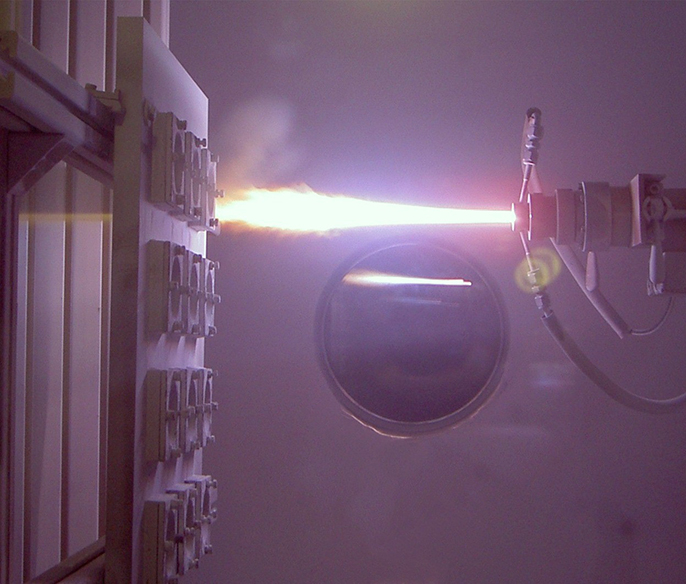Aerospace Materials MSc – delivering the future sustainable vision of aerospace
03/03/2020

The first month of the calendar year was a busy one for our Aerospace Materials MSc students, with exams, two teaching weeks and a private study week.
Aerospace Materials MSc in focus
January began with an interesting teaching week on “Materials Selection”. This involves working together in groups on a variety of design specifications, across a range of applications for aerospace through to automotive, using a recommended method to select and defend choices. Lots of discussion, followed by a week to work on a set problem in some depth, before the final, busy teaching week of “Surface Science and Engineering”.
Surface science engineering is a specialism at Cranfield University, where we have a breadth of unique facilities and a long-standing track record of research with partners such as Rolls-Royce. This module allows us to consider how surface engineering may be used to optimise the performance of a range of components; coating systems on aero-engine turbine blades are great examples, developed in collaboration with Rolls-Royce. We address a range of methods of depositing coatings, suitable analytical techniques to evaluate surfaces and how to assess performance in application such as friction, wear, aqueous corrosion and high temperature oxidation.
The start of February, with the taught element of the course completed, our students started the first of two research project opportunities. They met in their new, small, project teams to address the many industry design problems and research challenges that have been set for the groups. This experience is highly valued by both students and prospective employers. With support from external organisations, the findings will be presented to industry in 12 weeks which is a very exciting time for our students.
“The research part of the MSc greatly exceeded what I expected. Both the group and the individual projects were invaluably enriching experiences, and the main reason I decided to come back to undertake an EngD,” says Koldo Amandoz Forcén who graduated from the Aerospace Materials MSc course in 2017.
Aerospace materials enabling sustainable aviation
Never before has there been such a need for specialist engineers with a deep understanding of aerospace materials. There is a real demand for innovative thinkers to address environmental impact and sustainability with the sector to enable the next-generation aircraft and future aerospace. We continually review our course content and equipment to ensure our graduates have the skills needed to meet the future challenges.
Cranfield University is committed to support of materials research and has recently invested £1.6M in renewal of the ‘Electron Microscopy Suite’, part of our materials characterisation facilities. Students took part in introductory lectures last month, focused on a range of techniques and will use these new facilities to support their group design projects and later in their own individual research projects in the spring.
We look forward to our students completing their MSc course and seeing them develop material technologies to deliver the future sustainable vision of aerospace.
For more information or to apply for this MSc, please visit the Aerospace Materials MSc course page.
Dr Sue Impey, Course Director, Aerospace Materials MSc
MSc Programme Director: Manufacturing Technology and Materials
Categories & Tags:
Leave a comment on this post:
You might also like…
Keren Tuv: My Cranfield experience studying Renewable Energy
Hello, my name is Keren, I am from London, UK, and I am studying Renewable Energy MSc. My journey to discovering Cranfield University began when I first decided to return to academia to pursue ...
3D Metal Manufacturing in space: A look into the future
David Rico Sierra, Research Fellow in Additive Manufacturing, was recently involved in an exciting project to manufacture parts using 3D printers in space. Here he reflects on his time working with Airbus in Toulouse… ...
A Legacy of Courage: From India to Britain, Three Generations Find Their Home
My story begins with my grandfather, who plucked up the courage to travel aboard at the age of 22 and start a new life in the UK. I don’t think he would have thought that ...
Cranfield to JLR: mastering mechatronics for a dream career
My name is Jerin Tom, and in 2023 I graduated from Cranfield with an MSc in Automotive Mechatronics. Originally from India, I've always been fascinated by the world of automobiles. Why Cranfield and the ...
Bringing the vision of advanced air mobility closer to reality
Experts at Cranfield University led by Professor Antonios Tsourdos, Head of the Autonomous and Cyber-Physical Systems Centre, are part of the Air Mobility Ecosystem Consortium (AMEC), which aims to demonstrate the commercial and operational ...
Using grey literature in your research: A short guide
As you research and write your thesis, you might come across, or be looking for, ‘grey literature’. This is quite simply material that is either unpublished, or published but not in a commercial form. Types ...






